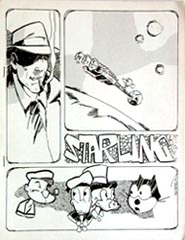Difference between revisions of "Starling"
m |
|||
| Line 2: | Line 2: | ||
'''Starling''' was a science fiction fanzine by [[Lesleigh Luttrell]] and Hank Luttrell. | '''Starling''' was a science fiction fanzine by [[Lesleigh Luttrell]] and Hank Luttrell. | ||
| − | ''Starling'' was first published in the 1960s in Missouri, U.S.A. The first two issues were published by Hank Luttrell with | + | ''Starling'' was first published in the 1960s in Missouri, U.S.A. The first two issues were published by Tim Eklund with Hank Luttrell and Roger Alan Cox (1964). Starting with #3, Luttrell published and edited it by himself, and was joined by Lesleigh Couch with issue #9 (1967), who became Lesleigh Luttrell in 1969. The two moved to Madison, Wisconsin, U.S.A. where they continued publishing. Early issues of ''Starling'' were distributed through the [[Southern Fandom Press Alliance]] APA. It was published for more than a decade, with issue 3 appeared in 1964 and issue 37 in 1979, the last issue so far. In 1975, ''Starling'' was nominated for a [[Hugo Award for Best Fanzine]]. |
In sf critic Rob Latham's article "Fanzine Research", in the April 2008 issue of [[el]],, he wrote of ''Starling'', [[Susan Wood]]'s [[Aspidistra]], and [[ODD]], by Raymond and [[Joyce Worley Katz|Joyce Fisher]] with Richard Elsberry, that they were, "vehicles of antiestablishment attitudes virtually indistinguishable at times from the contemporary underground press.” He cites these fanzines as examples of sf fans seeking "...to bring sf into dialogue with a larger universe of discourse and action—rather than, as elitist snobs sometimes suggest, looking to “escape” from the real world into aimless fantasy." | In sf critic Rob Latham's article "Fanzine Research", in the April 2008 issue of [[el]],, he wrote of ''Starling'', [[Susan Wood]]'s [[Aspidistra]], and [[ODD]], by Raymond and [[Joyce Worley Katz|Joyce Fisher]] with Richard Elsberry, that they were, "vehicles of antiestablishment attitudes virtually indistinguishable at times from the contemporary underground press.” He cites these fanzines as examples of sf fans seeking "...to bring sf into dialogue with a larger universe of discourse and action—rather than, as elitist snobs sometimes suggest, looking to “escape” from the real world into aimless fantasy." | ||
| − | Contributions of writing were by Grant Canfield, Michael Carlson, [[Juanita Coulson]] ([[Yandro]]), Roger Cox, Andrew Darlington ([[Ludd's Mill]]), James Dorr, Barry Gillam, Richard Gordon, Steve Grant, Clay Hamlin, Terry Hughes ([[Mota]], [[Science Fiction Five Yearly]]), Dwain Kaiser, Leo Kelley, | + | Contributions of writing were by Grant Canfield, Michael Carlson, [[Juanita Coulson]] ([[Yandro]]), Roger Cox, Andrew Darlington ([[Ludd's Mill]]), James Dorr, Barry Gillam, Richard Gordon, Steve Grant, Clay Hamlin, Terry Hughes ([[Mota]], [[Science Fiction Five Yearly]]), Dwain Kaiser, Leo Kelley, Banks Mebane, Tom Perry ([[Quark (Tom Perry)|Quark]]), Joe Sanders, A.M. Schneider, Angus Taylor, with his column called "Sgt. Pepper's Starship", Bob Tucker ([[Le Zombie]]), and Jim Turner. |
| − | Contributions of artwork were by John Berry, [[Sheryl Birkhead]] ([[The National Fantasy Fan]]), Grant Canfield, Tom Foster, Alexis Gilliland, John Ingham, Jay Kinney ([[Nope!]]), Denis Kitchen, Joe Pearson, James Shull ([[The Essence]]), Dan Steffan ([[Boonfark]]), and Reed Waller. | + | Contributions of artwork were by John Berry, [[Sheryl Birkhead]] ([[The National Fantasy Fan]]), Grant Canfield, Ken Fletcher, Tom Foster, Alexis Gilliland, John Ingham, Jay Kinney ([[Nope!]]), Denis Kitchen, Gene Klein (a.k.a. Gene Simmons) ([[Faun]]), Joe Pearson, Marc Sc |
| + | hirmeister, James Shull ([[The Essence]]), Dan Steffan ([[Boonfark]]), and Reed Waller. | ||
| − | Letters came from Douglas Barbour, Leigh Brackett, Juanita | + | Letters came from Douglas Barbour, Leigh Brackett, Juanita Coulson, Ray Nelson and Susan Wood. |
Lesleigh Couch Luttrell had previously co-published [[Quark]] with brother Chris Couch. | Lesleigh Couch Luttrell had previously co-published [[Quark]] with brother Chris Couch. | ||
Revision as of 20:46, 17 August 2013
Starling was a science fiction fanzine by Lesleigh Luttrell and Hank Luttrell.
Starling was first published in the 1960s in Missouri, U.S.A. The first two issues were published by Tim Eklund with Hank Luttrell and Roger Alan Cox (1964). Starting with #3, Luttrell published and edited it by himself, and was joined by Lesleigh Couch with issue #9 (1967), who became Lesleigh Luttrell in 1969. The two moved to Madison, Wisconsin, U.S.A. where they continued publishing. Early issues of Starling were distributed through the Southern Fandom Press Alliance APA. It was published for more than a decade, with issue 3 appeared in 1964 and issue 37 in 1979, the last issue so far. In 1975, Starling was nominated for a Hugo Award for Best Fanzine.
In sf critic Rob Latham's article "Fanzine Research", in the April 2008 issue of el,, he wrote of Starling, Susan Wood's Aspidistra, and ODD, by Raymond and Joyce Fisher with Richard Elsberry, that they were, "vehicles of antiestablishment attitudes virtually indistinguishable at times from the contemporary underground press.” He cites these fanzines as examples of sf fans seeking "...to bring sf into dialogue with a larger universe of discourse and action—rather than, as elitist snobs sometimes suggest, looking to “escape” from the real world into aimless fantasy."
Contributions of writing were by Grant Canfield, Michael Carlson, Juanita Coulson (Yandro), Roger Cox, Andrew Darlington (Ludd's Mill), James Dorr, Barry Gillam, Richard Gordon, Steve Grant, Clay Hamlin, Terry Hughes (Mota, Science Fiction Five Yearly), Dwain Kaiser, Leo Kelley, Banks Mebane, Tom Perry (Quark), Joe Sanders, A.M. Schneider, Angus Taylor, with his column called "Sgt. Pepper's Starship", Bob Tucker (Le Zombie), and Jim Turner.
Contributions of artwork were by John Berry, Sheryl Birkhead (The National Fantasy Fan), Grant Canfield, Ken Fletcher, Tom Foster, Alexis Gilliland, John Ingham, Jay Kinney (Nope!), Denis Kitchen, Gene Klein (a.k.a. Gene Simmons) (Faun), Joe Pearson, Marc Sc hirmeister, James Shull (The Essence), Dan Steffan (Boonfark), and Reed Waller.
Letters came from Douglas Barbour, Leigh Brackett, Juanita Coulson, Ray Nelson and Susan Wood.
Lesleigh Couch Luttrell had previously co-published Quark with brother Chris Couch.
